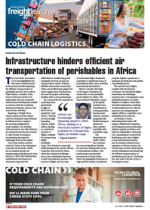Ongoing research and development to benchmark best cold chain practices has shown that South Africa compares well with other countries in terms of cold chain logistics.“Our cold chain is well managed and regulated and I believe we have great facilities,” said Lucien Jansen, CEO of the Perishable Products Export Control Board (PPECB).This is even truer given the complexities the South African cold chain has to deal with. “During 2022, we have experienced significant logistical challenges in the major ports,” said Jansen. “This unfortunately had an impact on the movement of cargo and ultimately on the quality of perishable produce. Efficiency improvements within the South African ports this year have, however, resulted in improved port productivity.”The single biggest challenge for the sector is however load-shedding and the impact it has on the cooling of perishables. Speaking to Freight News, Jansen said this created severe bottlenecks, as it took longer for produce to reach its optimum temperature. Business Leadership South Africa (BLSA) CEO Busi Mavuso warned that load-shedding was taking a toll on business across the board. With the harsher levels of load-shedding reduced during the month of June, she said it was imperative for business not to become complacent as the electricity system remained unable to deliver to the economy.“I am pleased, however, at the urgency and focus that both government and business are putting into dealing with the electricity crisis. We have an effective working relationship in place based on the Energy Action plan, which is spearheaded by the National Energy Crisis Committee (Necom), with which business is very engaged.”Jansen said electricity was, however, not the only crisis facing cold chain operators. “The state of infrastructure, including road and rail, is a concern. The condition of South African roads has deteriorated, negatively impacting road transportation and pallets and cartons during transportation on poorly maintained roads." He said while South Africa continued to compare well with other countries at present, it was imperative with the growth in exports to invest more in infrastructure for the country to remain competitive.

